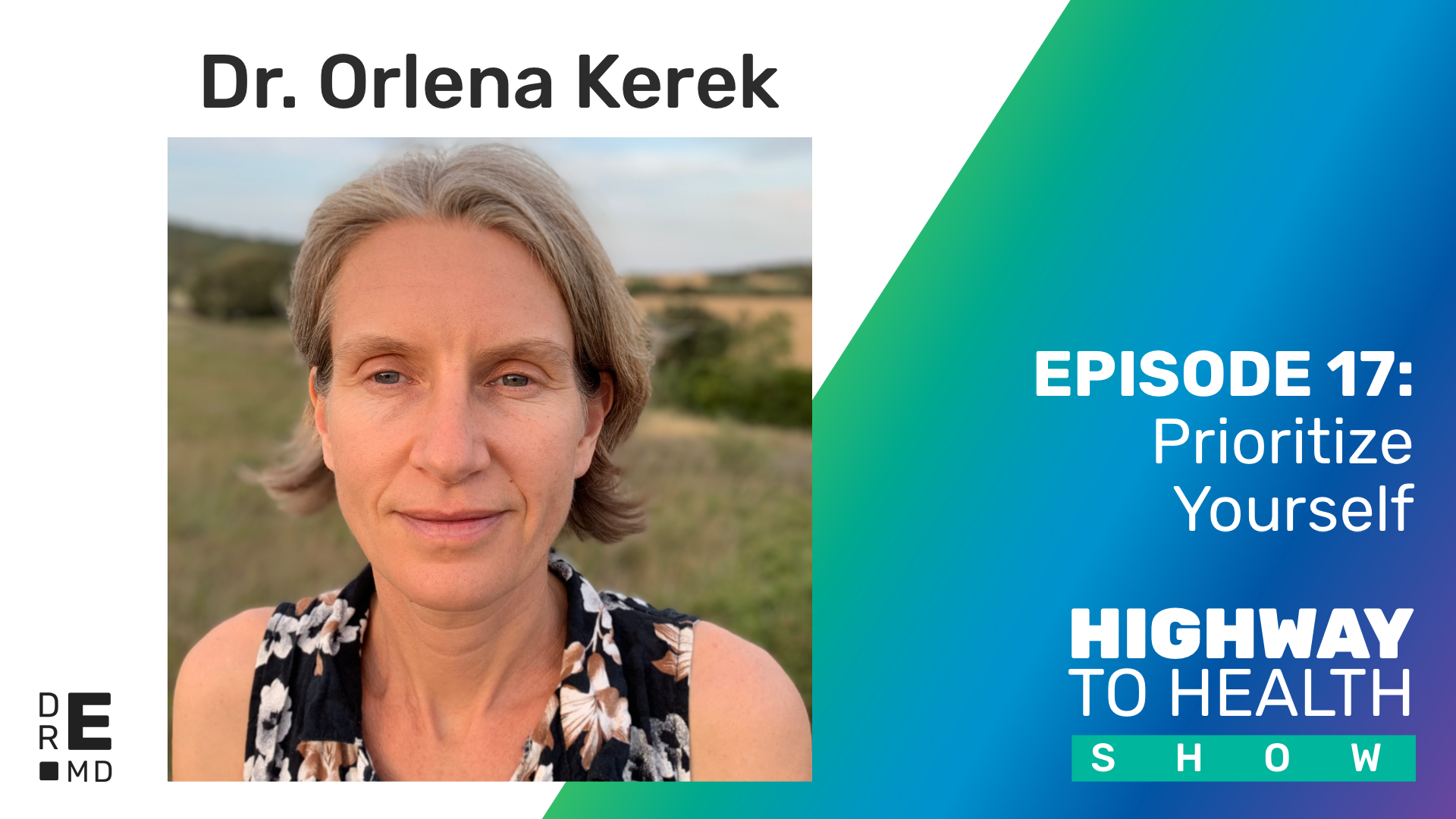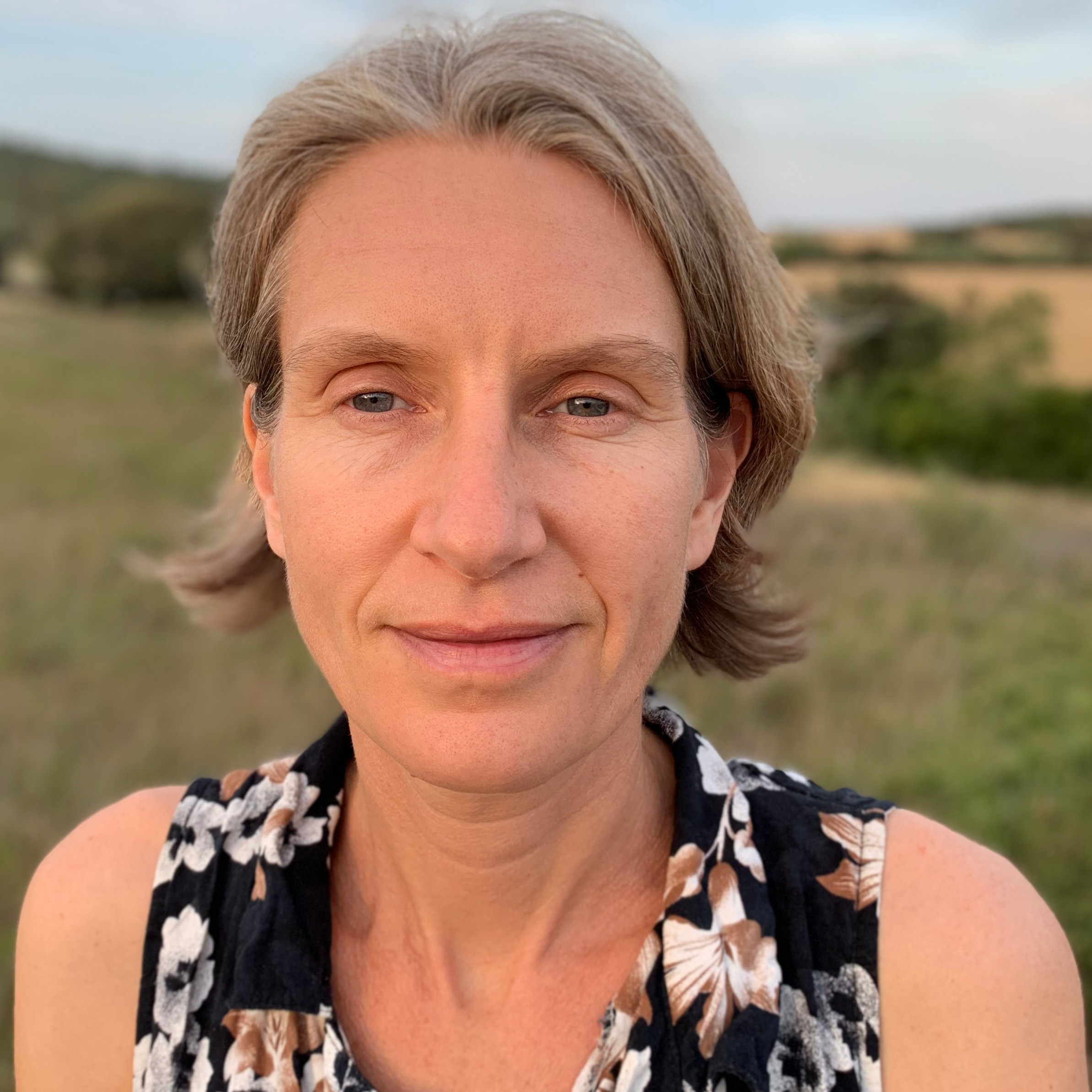Prioritize Yourself
Dr. E's Highway to Health Show Episode 17

In This Episode:
Dr Orlena Kerek is a former pediatrician, turned health, weight and life coach helping women over 40 achieve their ideal lives.
In this episode we spoke about the importance of prioritizing yourself in order to not only be healthier and happier but also to be more present with your family.
Original Air Date: June 26, 2019
watch this episode

Subscribe to highway to health
Actionable Steps:
- Prioritize yourself
- Prioritize your sleep
Questions About This Episode:
Episode Resources: Disclaimer:The links below can redirect to external websites where I may receive a small percentage of any purchases you make. This however, comes at no cost to you.
Find Dr. Orlena on:
- Email: orlena@drorlena.com
- Web: https://www.drorlena.com
Other Resources
Related Episodes
Show Notes
- Why Dr Orlena went into medicine
- Why she stopped practicing pediatrics
- How she’s found her ideal life in Spain
- The reasoning behind her career shift and become a health coach for women over 40
- Dr Orlena’s passion lies in helping people realize that they can lead a healthy life through nutrition, exercise, sleep and mindfulness.
- How to start creating the life you want.
- The importance of recognizing how our brains are “negatively wired” and how it affects our life.
- Why she focuses so much on educating patients instead of prescribing solutions.
- Why she refers to herself now as “a doctor before you need a doctor”.
- Why it is so important to prioritize yourself.
- How to start putting yourself first.
- The reasons that hold people back from prioritizing themselves.
- Why me time is so important for mothers.
- Learning to enjoy the bad bits of life because without them, there would be no good bits either.
Dr E: [00:00:03] Today I’m joined by Dr. Orlena. A busy mother of four kids who empowers women to be fit and fabulous after 40. She and I had a great conversation about living in Spain. She’s originally from the U.K. but moved to the northeast part of Spain many years ago leaving behind a career as a pediatrician. In this episode we talked about her current role as a health, weight and life coach empowering women all over the world and many more very interesting things.
Dr E: [00:00:27] And if you missed last week’s episode let me tell you that it was all about Keto. I was joined by Frank Llosa founder of KetoneAid. I learned a lot from him. And if you have ever thought about embarking or improving upon your Keto lifestyle that’s a great episode to listen to. That was Episode 16. So make sure you go look for it.
Dr E: [00:00:47] This episode is brought to you by our Highway to Health Facebook group. If you haven’t yet joined you can request to do so by going over to dre.show/group. And then just click on the appropriate button. You can also find that link on this episode description by the way. I really look forward to seeing you there. But now I won’t keep you any longer. Welcome to Episode 17 with Dr. Orlena.
Dr E: [00:01:10] And remember you’re on The Highway To Health and I’m your guide to get you there.
Intro / Outro: [00:01:15] Are you ready to live. Ageless. one to discover alternative health choices. Cutting edge nutrition and fitness for the entire family. Welcome to highway to health show with your host Dr. E.. The stem cell guy for Dr. E. helps you live ageless. And now here’s your host. Dr. E..
Dr E: [00:01:42] Hello everyone welcome to another episode of the highway to health show I’m your host Dr E. And joining me today is Dr. Orlena.
Dr E: [00:01:49] She’s a former pediatrician turned health wait and life coach and she’s also a busy mother of four. Dr. Orlena welcome to the show. Dr. Orlena: [00:01:57] Thank you so much for having me here. It’s lovely. Dr E: [00:01:59] So tell us a little bit about yourself. I know that you’re now in Spain. You’re originally from the U.K., you’re now in Spain… Tell us a little bit about yourself. What got you there?
Dr. Orlena: [00:02:07] That is a really interesting question and I could talk for days and days. So I started my pediatric career in the U.K. and I always had this burning desire to work somewhere else. And I think part of the reason I went into medicine was so that I could work and travel and I decided I wanted to change my lifestyle basically and I thought “Oh we’re all in the EU. I’ll be able to work”. Well to cut a long story short, that didn’t exactly happen. But now I find myself here doing online stuff which I totally love and couldn’t be happier. I’ve now created my amazing ideal life and that’s what I help other people do now.
Dr E: [00:02:47] So tell me a little bit about that amazing ideal life. What is that about. Because you were formerly a pediatrician and now you’ve found another really interesting calling and I know you’re very passionate about it. So tell me about that.
Dr. Orlena: [00:02:58] Yeah. Well I think my calling my passion my general message is to tell people that they can lead a healthy life and they can lead a healthy life through nutrition and exercise and mindfulness and sleep is another big important thing. We have our health in our hands and I know as a physician you can’t promise that 100 percent of the time of course you can’t. But so much of our health is in our hands. And I think so many people don’t realize that. So that’s my big big message. And a lot of the people I work with with weight loss because obviously they want to lose weight but actually when you take that step further and so using all these tools that you use to think about changing your life you can apply it to any part of your life. So for example your relationships with your kids or stress levels or what you really want to do with life. And that is what I find absolutely amazing. So for me I have created my amazing life in Spain and I live this very deliberate life which is really cherishing every moment. And on one level you can say oh well it’s totally mundane. I look out four kids I do a lot of laundry I go swimming. But on another level I can say you but I get to go swimming and all my peers in the U.K. they don’t get to go swimming two days a week. So it’s that kind of thing that I work with.
Dr E: [00:04:13] That’s amazing. And it’s when you have been purposeful about creating the life you want, it is amazing how often people actually achieve it. And I would say like almost all the time however it is a very small minority of people who do this purposefully. Why do you think that happens?
Dr. Orlena: [00:04:33] Well I think that is a very interesting question and I think for different reasons. And I think a lot of people for example feel very trapped in financial whatever it is they do so they have to have a job and money. Now I was kind of lucky kind of unlucky in that when I decided to move to Spain and I thought I was going to carry on my political career. I say I accidentally lost my career and that definitely wasn’t deliberate and for me that gave me a certain amount of sadness and I had to work through all of that. And for me that was one of the triggers of really getting to the bottom of emotions and understanding how to be deliberate in your emotions and understanding that not all negative emotions are bad but that we don’t want spin in these negative emotions. So I think that is one big thing. People feel trapped and the flip side of that is I think people just don’t realize they can do it. They just think it’s too difficult for me it’s too away from me. I don’t know how to do it. And it’s almost like you’re stuck in a hamster wheel and you’re busy going round and round and round and round and you don’t take time out and go, OK so what do I really want? What is actually important in my life? And I think that we all should be taking that time out and just reflecting on our lives and going: “Yeah this is what’s important in my life and this is what I want to do.” So there’s two reasons I think of the main reason and I’m just I have no evidence to prove that. That’s just my my thoughts.
Dr E: [00:05:59] And I obviously think for obvious reasons you went a little bit more into the traveling or moving way or those things but in your work with your patients whether in person or online how important do you think it is for them to be purposeful about their goals? And because their goals their life goals can be you know like you did to pack up your bags and travel to a different country and just move to a different country. But for many of them can be just to regain their health, to drop a couple of pounds, to become energetic, to be there for their kids… How important do you think how important have you seen in your experience for this mindset to be?
Dr. Orlena: [00:06:37] Yeah, no I think it’s really important. And I don’t think it matters what your goal is. But if you say for example, if you think about weight loss and go: “Well, I would really like to lose some weight” and a lot of people are in that situation and then they go: “Well I’m gonna try this thing.” And then after a while they do it for a bit. It doesn’t work. They don’t get the results, and they give up because you can see why they think they’re doing the wrong thing. Whereas if you do that in a really deliberate way and think OK it’s going to take longer than two months; it’s going to take six months, a year or depending on how you do it. I’m actually going to really really focus on this goal and I’m going to get there. And it’s not necessarily going to be success, after success, after success. I love this quote. They say I can’t quite remember it but it goes about success being further down the line than failure. So you have to expect to fail. Things aren’t going to work out. You fail, you fail, until you succeed rather than fail and give up. But the thing that keeps you going is if you know what your goal is and you know that you can realistically achieve that goal even if it’s not today or tomorrow then that’s going to keep you going. Whether it’s weight loss, or connection with your kids, or having your house tidy it doesn’t matter what the goal is.
Dr E: [00:07:50] And, as a physician, how important do you think that mindset –and teaching that mindset to patients– How important do you think that is?
Dr E: [00:08:02] I know that not a lot of doctors do it but, the more we keep looking into it, the more people that I have the chance to interview here, the more practitioners and physicians that I’m able to talk to, the more that I arrive at this conclusion that a lot of the times our job as physicians is not just to prescribe something, not just to give them the solution but also to be that support for them. Do you find this to be true? Do you find this to be necessary?
Dr. Orlena: [00:08:28] Yeah absolutely. I mean it’s what I say now is I’m a doctor before you need your doctors and all the work I do is about helping you lead that healthy life. I think as you look at physicians and think about lifestyle illnesses and a lot of them that people have and sometimes as a physician when you give someone that diagnosis that’s enough to change their mindset. But you do it automatically because suddenly they go “oh wow I really need to make these changes.” And a lot of people don’t have that outside influence. They just decide it themselves. But a lot of people think “well, I can’t do it. I can’t do it. I’ve tried everything. I can’t do it.” And, that’s not true. We all have bodies. We all have the same physiology. We don’t all have the same starting points but all our bodies work in the same way. And it might be that you have to try certain things. I would say nutrition is very individual and you have to find what works for you other than what works for other people. And so finding that thing can sometimes be difficult. But there is no reason why you can’t make those changes other than of course your brain, and your habits, and your desires to all those are the things that people think that they’ve tried and they come up against this habit that their body has and go wow I can’t do it. And they just don’t understand that difference between your thinking brain, your prefrontal cortex, and your body, which is just like you know I’m used to doing this. I can’t make changes but we can all make changes and in fact there’s another fantastic statistic that I love. I don’t think statistic is the right word but the people do have good habits aren’t more disciplined than people who have not great habits. They have just set their life up in a way to make those habits easy and that I think is another key that’s really important to whatever change you want to make in your life.
Dr E: [00:10:15] Yeah it is crazy how we operate on algorithms in a way is like when I wake up I do this and I do this and I do this and it’s just as easy or just a simple –not easy–, just as simple to set up proper positive habits or to allow not so positive habits to just take hold of your life and when you realize it, you’re living in on autopilot and you’re just, you’re not aware of the choices that you’re doing whether it’s with finances, whether it’s with health, whether it is with pretty much anything else. And it’s just a matter of the kind of habits that you work into your life. I think that’s actually a very important observation.
Dr. Orlena: [00:10:52] I think that’s one reason why it’s a really good idea to take a step back from your life every now and then and to have a look at those habits and think “Well OK. Here’s my goal.” Are these habits serving me or, are they not serving me?” And all habits give you something because they give you a reward. They give you that dopamine rush, so every habit we have is serving us on one level. But is it helping us get to that end goal? And that’s the important thing.
Dr E: [00:11:16] And it is crazy how often this has been the underlying factor of pretty much every episode and every conversation that I’ve had with different experts in different fields whether it’s mindset, whether it is health, whether it is fitness, whatever we’ve been talking about. It is really a matter of forcing us to step back and take a look at our lives and really look at the direction in which we’re heading because a lot of the times we just live our days based on what’s in our calendar for today. But we weren’t even intentional about what’s in our calendar. We didn’t even have an end goal. It’s just like you said at the beginning. It’s just like that hamster wheel and we just hope that we’ll eventually get off it. But we really a lot of the times don’t have a plan for it. And we can be on several hamster wheels at the same time one of them being health, and one of them being our family, one of them being our personal goals, one of them being our financial and, not having a clear outcome and understanding our habits that will get us there and that are serving us to get there. It’s a sure recipe for disaster.
Dr. Orlena: [00:12:20] Yeah, and I agree and I think one of the things that happened he was saying earlier that a lot of your listeners are mothers and I think one of the things that happens to mothers is that busy leading their lives doing whatever it is they’re doing and they may have set goals then. And then they have kids and their entire focus changes and they put the needs of their children and their family and they find themselves doing all of these things for their children and they totally forget about themselves and they put themselves right at the bottom of the pile. And I know that’s that’s what I did. And I think one really important thing is that the best thing you can do for your kids is to be happy yourself because then everything falls into place. And if you aren’t happy, if you haven’t got those goals right and you aren’t spending enough time looking after yourself then you can’t look after your kids properly and that is basically the bottom line.
Dr E: [00:13:09] While that’s a great insight and it reminds me. As a matter of fact one of our previous episodes, I believe it was Episode 13 with Regina Lawrence and she describes this personality or this way of acting of mostly moms but also happens to dads or to people in general as the noble struggler.
Dr E: [00:13:27] Something that we suddenly say like well yeah I don’t have time for myself I cannot take care of myself. I don’t have time to exercise because I’m caring for my kids, because I’m caring for my husband, because I have to make sure that the house is in order for all these things. And they think that they’re doing the right thing. They’re kind of like becoming this martyr but that’s really not serving anyone. And you just said it yourself it’s the most important thing you can do for your kids is to be happy yourself.
Dr. Orlena: [00:13:51] Yeah and I think you can see what happens. If you think about a baby when they’re born. They basically need 24 hours of your care. And as the child grows older, and you know they’re waking up through the night and you are tired and you don’t have time to do any of this. And gradually as they grow older they get more autonomy and they can start doing things for themselves. But we’re still in that habit of being there all the time and there comes a point where you go: “hey, you know what? Now I can do something else, I can go to the park and I can, I don’t know, run around by myself” rather than having to play with my child all the time. Or you know what? I can go to the bathroom by myself.
Dr E: [00:14:28] My wife… We spoke at the beginning and our son is 19 months now and my wife is currently envying that situation. She’s like oh I remember when I was able to go to bathroom by myself.
Dr. Orlena: [00:14:39] Yeah. But you know what you really have to love it as well because I know it is really hard work. I know children are really, really frustrating. But they do just grow up so amazingly quickly that you just have to really cherish all the not great bits as well. And it’s interesting that our brains are negatively wired. And looking at my kids, I have suspected this for a while because they constantly say no to everything: “You wanna go to the beach?” -No. “Should we leave the beach?” -No. “You want to get in the bath?” -No. “You want to leave the bath?” -No. But actually it is true that our brains are negatively wired and we have to make a full effort to override that. And so one really lovely way is to just notice those good things that happen in our life. So it can be just holding a small child’s hand and just feeling that softness and that beautiful smell that babies have. And really just drinking it all in because in a few moments they’re going to be screaming and you’re going to be struggling with your mirror neurons which are going to make you upset. But you know, we just have to enjoy it. The good bits and the bad bits. And I know it’s difficult to say I have to enjoy the bad bits but you know the good bits in the bad bits come together.
Dr E: [00:15:44] Exactly. They’re just two sides of the same coin. And believe me I struggle with it. I see my wife’s been struggling with it but it is what it is. And that’s when you hear everyone, –it sounds cliche– but everyone says like: you know what? I wouldn’t change it for anything. Because in order to get rid of the bad things you have to say no to all the little good things which are a lot. And they usually are a lot more of the good things than the bad things.
Dr. Orlena: [00:16:08] Yeah I think expectations is a good thing to manage as well. I remember when I had my first child. And my first child will be eleven in a few weeks time. And I had this idea that I was going to sit in the garden and he was going to be in his little Moses basket and there’d be bees humming and flowers and I would be reading a book and thinking: wow, this is amazing. And prior to that I’ve been working long, long hours in the hospital. So this is my, you know, bliss moment that I was having. Clearly, when it arrived he didn’t sleep through the night and I was exhausted and it just didn’t happen like that. And I think if we’re really honest about parenthood and say you know what. –Actually I read an article that said that for the first six years of a parent’s life they don’t get proper sleep–, then you’re going to be better prepared and you’re going to then appreciate those good bits. But when you think, oh my goodness it’s going to be unicorns and babies and it turns out to be not so many unicorns and daisies and we get upset about that.
Dr E: [00:17:02] Exactly. Exactly. And that actually brings me. You know I wanted to switch gears and that’s actually a great segway. I know that you work a lot with women mostly over 40. What do you find most challenging for them in order to regain and maintain their health, their energy, their drive, their libido even. What do you find as most challenging for them?
Dr. Orlena: [00:17:22] I think. It’s everything. You know I think as a physician I will say these are the things that you need to do. So we work with depending on where they are and what they go from: nutrition and sleep it’s super super important. I think the research on sleep recently has been amazing and we haven’t really understood exactly what sleep does to us and how it’s really super important to have sleep and exercise and emotions. But including me time and making sure that you look after yourself in terms of stress levels. And I think that, just people want to do everything at once and realistically it’s very difficult to change your life all at once. The people are busy busy busy. And it’s again, stepping out and taking that time. So some of the women I work with, we do this one on one and I’m just working with them and sometimes it’s because they want to teach their family healthy eating but they just are so busy that they don’t have time to work it out. And for me, I think it feels really easy. I’m like: well, how about we try cooking this and this and you can use a slow cooker… But they just don’t have time to reflect on where they get into the –it’s like they need someone to look at their life from the outside– and say: ok, you need to do this thing first, and then this thing and then this thing and then they do it, and they’re fine.
Dr E: [00:18:35] Do you also feel like the expectations are way too high on motherhood and women in general? On, listen you have to be a gourmet chef, you have to be like the absolute best mom and you have to be there for everything with your kids. And you still have to work out. And you still have to care for your spouse. Do you find that those expectations are just unrealistic for most of these moms?
Dr. Orlena: [00:19:00] I don’t know if they’re unrealistic. But yes. I totally agree with you. And I think again it’s about what’s important to you. So I have a client whom I’ve been working with. And, you know I think our culture is we have to be high flyers. Now she’s already a high flyer, but she’s like well, I need to get this promotion and this job. And I want this prowess of doing this. And when you really unravel that and go: ok, so what’s important to you? You want to spend time with your children and you want to have that connection. And OK. This job will give you more money. But what are you going to spend that money on? Actually you going to use that money so that you can have more relaxation time and spend some more time with your kids. Or you could just stay where you are and enjoy your life as you are. And work on those relationships that you have with your children. But it’s just working out what’s important to you and it is very difficult juggling everything. But yeah, I think generally in life we have this –or in modern times– we have this idea that we have to be busy, busy, busy. Doing, doing, doing. Achieving, achieving, achieving. And there’s very little time to go: oh, I’m just actually living. Like: this is my life. This is what happens. We’re born. We do all these days, all these days a kind of repetitive. We get up, we have breakfast, we do whatever in the middle and we go to bed. And that happens to everybody. But you don’t need all of those riches or a super high flying job to sit and enjoy your children and really appreciate what you have in life.
Dr E: [00:20:27] Yeah I totally agree. And I didn’t mean unrealistic in a way of mothers cannot achieve this. I meant unrealistic in a way of; one of my mentors has always said that you can achieve anything you want but the first step is to recognize that you cannot do everything. So you’re able to do anything the moment you recognize that you cannot do everything. So you really need to step back and figure out, OK what of all these things that I’ve arbitrarily set as goals, what of them are really important and why? And then you can focus really and narrow down on those.
Dr E: [00:21:01] Because we see it even with fitness and with training and with health up to a certain point. And people are like well, I really want to have 9 percent body fat and I want to do an Ironman triathlon and I want to do all these things and that requires a lot of effort and it’s a great goal to have for a lot of people. But when you start unpacking it, and you recognize it, or you ask, or you really dive deep into it like: why do you want to do that? Well, because I want to be really, really healthy. Like oh, you don’t necessarily need to be an ironman athlete to be really, really healthy and be able to be energetic and live life with your kids. So that’s really what I meant by unrealistic. Not that it wasn’t achievable but that maybe it wasn’t the right thing to try to strive for.
Dr. Orlena: [00:21:41] Yeah, I totally hear what you’re saying and just backtracking a little bit, thinking about being a pediatrician and talking about connections with children. Actually what’s important with your connection with your children is not the amount of time you spend with your children but the quality of time that you spend with your children. So that when you’re with your children you’re there with your children. Actually you can work long hours and when you get home drop everything and be with your children and still be an amazing parent. And on the contrary you can spend hours and hours and hours with your kids but if you live somewhere else and not actually paying them any attention. I know it’s all about parents but I just want to illustrate that it’s about quality rather than quantity.
Dr E: [00:22:20] Yeah, that’s what we see a lot as well. You go to a playground and you see all these parents but they’re on their phones. They’re talking amongst themselves they’re not really enjoying time with their kids so I think that’s just as important when you’re in the office, be in the office. When you’re at home, be at home and be 100 percent present.
Dr E: [00:22:35] Now, before we wrap this up: What would be your top two or three recommendations? Practical, actionable steps for those busy moms that are listening to us right now and are saying you know what? Maybe that’s exactly what I need and that sounds like something that I’ve been struggling with. And I’d like to get a better grasp, better sense of control of my life and my goals. What would be your top two or three things?
Dr. Orlena: [00:22:56] My first thing is to prioritize yourself. And I think this is going back to what we were saying earlier. It’s really difficult for mothers to prioritize themselves. But actually when you prioritize yourself you have more energy to put into all those other things you need to do.
Dr. Orlena: [00:23:09] And, I think my second tip would be about prioritizing your sleep. I think people really don’t realize how important sleep is. And so many people have problems prioritizing their sleep but actually if you can get seven to eight hours sleep at nighttime, you’re going to be far more productive in the morning to do whatever it is you want to do. Whether it’s your business or be with your kids or work in your goal. And if your goal is weight loss then actually tiredness contributes to overeating so… There you go. Prioritize yourself and sleep and then take whatever else you want to do and you can do it.
Dr E: [00:23:41] We’re hearing a lot about sleep recently and I couldn’t agree with you more. While a couple of years ago it was all about: “oh, I’m able to do two hours sleep a night and I hustle and I’m a warrior and I do all these things.” Now we’re really, all the research is coming out and it’s an equivocal. High, good quality sleep. What do you think is affecting most people with their quality of sleep and what would you suggest for them to start changing and to start improving their sleep?
Dr. Orlena: [00:24:07] Well I had a podcast about sleep coming up so they should perhaps listen to this. Where I interview a lady who’s a cardiologist and she talks about it. But to me there are lots of tips that you can do. So things like, you know, putting on blue lights and not using your screens and things like that. But I think it comes down to prioritizing sleep and I think this is one of those mind that shifts that you need to really be aware of. And one thing that I see is that people go OK I’m going to prioritize sleep. And it’s really easy… You sort of say well, I need eight hours sleep. If I get up at 7:00, I need to be in bed by 11:00. Then 12:00. What are they doing? They’re on their phones, or reading that book or watching TV.
Dr. Orlena: [00:24:44] And I think one of the things I see is this inertia of change. Once we’re doing something, we’re happy doing something, whether that’s reading your book or watching telly and then you just don’t want to move and you really have to make yourself do that. It’s like the kids: they don’t want to get in the bath, they don’t want to get out of the bath. We’re the same. Adults are exactly the same. We’re doing something. We’re reading a book; we don’t put the book down. We’re watching telly; we don’t want to change from watching telly. So I think that mindset shift is the most important thing. And then everything else will fall into place. It is difficult for parents because they have children who are waking up in the middle of the night and when they’re very, very little they need to be fed and they might need nappy changes. And then as they get older they might get scared. It does get better and you just have to work through that. And I don’t think there’s any way around that, having your child wake you up. You can’t do anything about that.
Dr E: [00:25:35] Yeah absolutely, absolutely. The other thing that I noticed for instance with my wife is that, come bedtime and we put the baby to sleep… Well, she puts the baby to sleep or I put the baby to sleep. Most of the time it’s her. And then she’s totally, completely, completely knackered, she’s tired, she’s lying on the couch I say well just go to bed. She’s like I don’t really want to because it’s the only me time that I have. I know that when I go to bed the moment I wake up I need to start caring for him again. So I totally agree with you that it has to be a mindset shift. Anyone who would listen to this would totally agree with her at that point and say you know what. Yeah that does make sense. She does need that alone time. She does need all those things but at least from the research and from the science that’s coming out, I do think that it is just as important to prioritize your sleep at that point.
Dr. Orlena: [00:26:22] Going back to prioritizing yourself you see. So if she has some me time during the day then she won’t feel like that. But she feels like that because she has no me time. And I know it’s really difficult when you have young kids because they are constantly there but there are ways around that. There are ways to find someone to say well can you look after my child for an hour and I’m really gonna do that thing that replenishes me that I really love doing. That is my me time. Whether it’s something as simple as going and meeting your friends and having coffee with your friends and I suspect going back to those parents who were in the playground and they’re busy chatting they’re trying to get some me time. That’s their connection time with their friends.
Dr E: [00:27:01] Yeah it’s important to understand it’s not really a blaming game. It’s just really understanding and being purposeful about what’s happening. I totally empathize because I see it and I try to help her as much as I possibly can but I also have a lot of other different requirements different obligations. So yeah, I totally agree, I do empathize.
Dr. Orlena: [00:27:18] My point of view when I had young kids I found it really difficult to get somebody else to look after them and I could send them to nursery and that was a heartbreak for me. To go: oh my children can go to nursery and then another level: yeah but you need some time to do something else. You can’t be with your children 24 hours a day.
Dr E: [00:27:34] Exactly.
Dr. Orlena: [00:27:35] So it’s partly this internal mindset thing like: OK, my child will be fine without me. In fact, you know, they scream and cry and shout and then you walk away and they’re busy happily playing and you’re like Hey you’re supposed to be crying because you’re missing me and they’re totally rocking it.
Dr E: [00:27:51] That’s exactly what happens. We’ve been going to a gym that has daycare and that’s experience that we’ve had. First couple of days he didn’t want to stay there and now the last couple of days he doesn’t want to leave once she’s done with her workout and she goes picks him up and he’s too busy having fun or talking to the other kids or anything like that.
Dr E: [00:28:07] But anyway, thank you so much again for being with us. Where can people find out more about you and maybe even work with you if they were so interested?
Dr. Orlena: [00:28:14] Thank you. Thank you for asking me. My website is drorlena.com. So Orlena is a bit of a strange name. It’s O R L E N A and I have a podcast called Fit and Fabulous but you can either find the link on my Web site or obviously it’s in iTunes.
Dr E: [00:28:27] We’ll link it in the show notes.
Dr. Orlena: [00:28:29] Fabulous. Thank you so much and thank you for having me. It’s been an absolute pleasure.
Dr E: [00:28:33] Perfect. Well, once again thank you so much for being here and for everyone listening: this has been Episode 17 of The Highway to Health Show. Thank you again for tuning in.
Dr E: [00:28:42] You can find the entire show notes, the description, the links, everything that we’ve spoken about at dre.show/017. That’s Dr. E dot show forward slash 0 17. I’ll make sure to put everything there, all the different links, you can follow Dr Orlena. I’ll put links to her podcast and if you have any questions make sure to send them our way and we’ll make sure to forward it to her. Or just go to her website and pose them directly there. She’s been helping a lot of women and I’m sure she’ll be able to help you if you have any additional questions.
Dr E: [00:29:14] Once again thank you everyone for tuning in. This has been the Highway to Health Show, Episode 17.
Intro / Outro: [00:29:20] Thank you for listening to Dr. E’s Highway to Health Show. Helping you learn the science of living ageless. Did you enjoy the show? Please Like, Share and subscribe where you listen to podcasts. Doctor E wants to hear from you. Go to D. R. E. dot show. Again. That’s. Dr E dot show. Until next time. This is Dr. E’s Highway to Health. Helping you live ageless.
Our Guest for this Episode:
Dr Orlena is a paediatric doctor turned health, weight and life coach. “A doctor before you need a doctor!”









